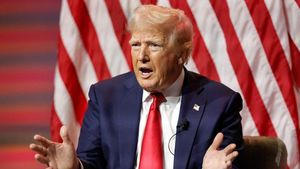The U.S. Centers for Disease Control and Prevention (CDC) and other federal health agencies made headlines recently by removing extensive HIV-related content from their websites. This decision came as part of the Trump administration's broader initiative to eliminate discussions of diversity, equity, and inclusion (DEI) across federal platforms.
On January 31, 2023, the CDC took down multiple pages, including resources detailing HIV statistics among various demographics, particularly focusing on transgender individuals. According to reports, the agency scrambled to comply with directives issued by the Office of Personnel Management following President Trump’s executive order mandicating the recognition of only male and female genders.
The timeline was tight: agency staff were notified just days prior to take all action by 5 p.m. on the deadline day. An anonymous CDC employee commented, “There’s just so much gender content in HIV…we have to take everything down to meet the deadline,” referencing the overwhelming necessity they faced with the sudden policy shift.
These sweeping removals have raised significant alarm among health advocates, particularly those focused on HIV prevention efforts for marginalized communities disproportionately affected by the virus, including Black, Latino, and transgender populations. John Peller, the head of the AIDS Foundation Chicago, condemned the actions, expressing concern over the impact of these removals: “This is very alarming. Basic health information is going dark.”
Health experts fear the consequences of erasing vast amounts of available information on healthcare resources and data, viewing it as counterproductive to efforts aimed at combating diseases such as HIV. For example, pages containing statistics on HIV infection rates, methods of testing, and treatment protocols have suddenly disappeared, creating what the Infectious Diseases Society of America calls “a dangerous gap” in the scientific information necessary for monitoring and responding to public health crises.
The elimination of these pages has been cast under the broader umbrella of the executive order, which many view as solely aimed at shifting conversations surrounding gender identity from inclusion to exclusion. The government's latest push mandates references to gender identity be stripped away from public documents, educational materials, and communications, providing considerable resistance from organizational leaders within federal health agencies.
Nate Brought, from the executive office of the National Institutes of Health (NIH), sent ripples through the organization by urging leadership to challenge the newly imposed directives. He cited concerns about the ramifications of compliance, stating, “By complying with these orders, we will be denigrated contributions made to the NIH mission by trans and intersex members of our staff…” Brought warned this puts significant numbers of Americans at risk of mental health crises.
Adding to the historical complexity, the intersection of politics and public health has been fraught with tensions, especially concerning HIV advocacy. Much like how President Reagan faced backlash during the slow response to the AIDS crisis of the 1980s, Trump’s administration’s recent decisions have echoed former sentiments of neglect. While the precise implication on funding for HIV-related research remains uncertain, shifts are brewing under the new leadership within the Department of Health and Human Services (HHS).
With the imperative to combat HIV tied closely to factors including race and gender identity, experts stress the need for nuanced and targeted policies, which are now at risk of being dismantled. “An HIV prevention policy without the ability to tailor outreach…could increase stigma…,” expressed Lindsey Dawson from the KFF nonprofit group, highlighting how health outcomes could regress as initiatives destined for marginalized communities fall prey to administrative constraints.
Longstanding financial support from the federal government facilitated various outreach programs, community resource provision, and scientific research surrounding HIV. Still, apprehensions linger about the possibility of funding shifts as pressure mounts across health platforms under Trump’s administration. Advocacy for behavioral research, treatment methodologies, and epidemiological studies could all access serious cuts or restrictions.
Reports highlighted the sudden removal of entire categories of research data—an alarming trend considering the rapid rise of incidences of HIV among gay and bisexual men and racial minorities. Recent statistics indicated this demographic accounted for two-thirds of new infections, underscoring the potential ramifications of silencing these narratives by stripping away data detailing health disparities.
The actions taken not only reflect immediate structural adjustments but also resonate transparently with concerns about resource allocation and effective public health initiatives. Stripped of necessary data streams and support, health advocates voiced fears over long-term consequences for individuals at risk of HIV and other health disparities.
“We are scrambling to figure out what to do,” said the anonymous CDC employee, capturing the overall sentiment within federal agencies now grappling with the fallout of these sweeping orders. It highlights the unsettling reality of how politics can eliminate voices advocating for body autonomy and equal health access, thrusting communities already at risk even closer to the margins of invisibility.



